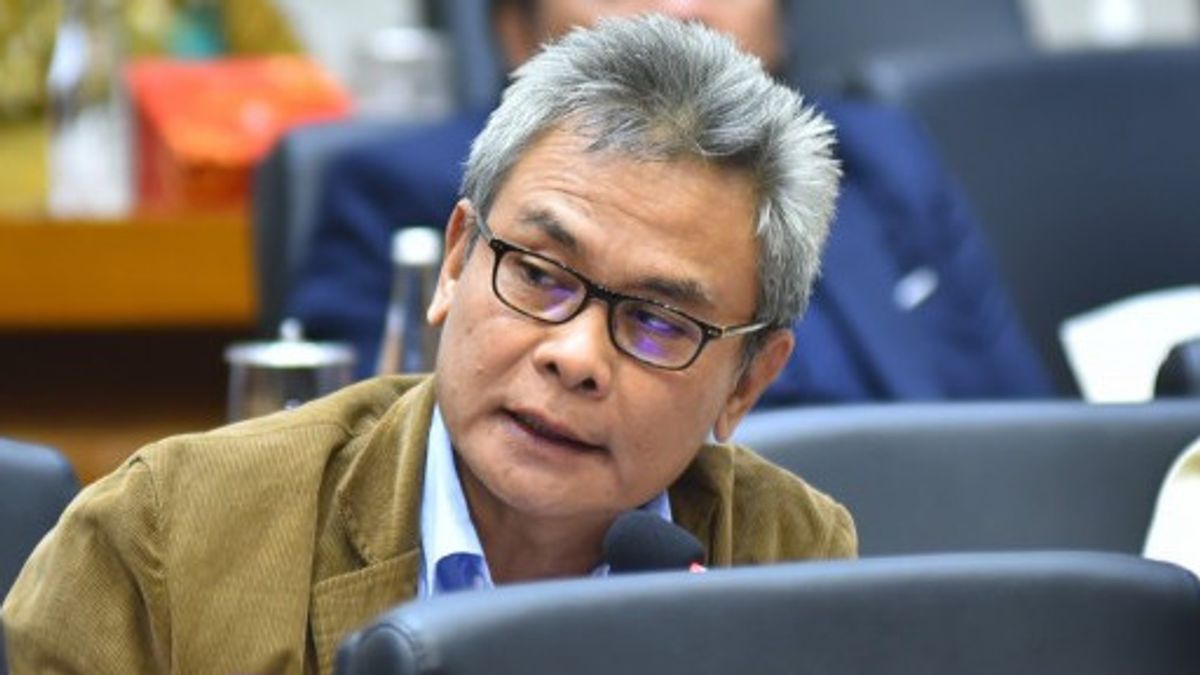JAKARTA - Commission III of the House of Representatives encourages the task force (Satgas) for the Crime of Trafficking in Persons (TPPO) formed by the National Police not to be afraid to dismantle the network of people's trade mafia. The National Police's TIP Task Force was asked to take firm action to resolve the TIP case, which has become a scourge in this country.
"The TIP Task Force was formed to resolve cases of trade in people who are in an emergency in this country. So I ask you not to be afraid when eradicating this mafia network," said Member of Commission III of the Indonesian House of Representatives, Johan Budi, Tuesday, June 13.
The TIP Task Force formed by the National Police was made on a follow-up to the direction of President Joko Widodo (Jokowi). This follows the large number of cases of trafficking in Indonesian citizens (WNI), especially Indonesian migrant workers (PMI) who work abroad via non-formal or illegal channels.
Therefore, Johan Budi appreciated the National Police for establishing the TIP Task Force because it could help fight trafficking syndicates and the placement of illegal PMIs.
"So far, we have always voiced the issue of trafficking in persons to the government so that the existence of the TIP mafia is immediately eradicated. It must be completely crushed to the roots, not half-heartedly," he said.
Johan Budi assessed that the TIP Task Force, which was formed from the National Police Headquarters (Mabes) to the Regional Police ranks, would strengthen the effectiveness of handling TIP cases in all regions of the country. Moreover, cases of placing PMIs to destination countries without formal channels occur a lot due to the existence of mafia networks.
"This person's trade syndicate is already very worrying. The state must not stand still, and must prove its defenses so that the trade mafias of people are immediately eradicated," said Johan Budi.
Based on the latest data compiled by the Indonesian Migrant Workers Protection Agency BP2MI, the most known TIP cases came from DKI Jakarta (506 cases), West Java (264 cases), Riau Islands (139 cases), East Java (96 cases), and NTB (92 cases).
The largest mode of TIP is targeting underage female Commercial Sex Workers (PSK), Indonesian Migrant Workers (122 cases), domestic workers (30 cases), crew members (14 cases) and online scamming in Cambodia (864 cases), the Philippines (107 cases), Myanmar (81 cases), Laos (102 cases), and Thailand (31 cases).
Commission III of the DPR in charge of law enforcement affairs also hopes that the TIP Task Force can complete the people's trade mafia from upstream to downstream. In particular, said Johan Budi, the parties behind the trafficking syndicate network.
"Because if the upstream is not resolved, the completion of this people's trade mafia network will be difficult to eradicate. If so, the cases downstream will continue to increase," said the legislator from the East Java VII electoral district.
Johan Budi assessed that the TIP Task Force had so far only resolved the problem of trafficking in people downstream. Such as thwarting the delivery of victims of TIP and raiding the location of the shelter.
To note, the TIP Task Force in Nunukan, North Kalimantan, rescued 123 victims of trafficking in persons consisting of 74 men, 29 women, and 20 children. They come from various regions to be smuggled into Tawau, Malaysia.
Not only that, the TIP Task Force also raided a house that was used as a PMI shelter in Karangsari Village, Lumajang, East Java. In this raid, the police arrested one suspect who was the distributor of trafficking in persons and rescued ten PMI candidates who would be illegally dispatched.
"What has been done by the TIP Task Force, we appreciate it because it can work quickly to crush various crimes of trafficking in persons," said Johan Budi.
Even so, Commission III of the DPR hopes that the National Police's TIP Task Force can also collaborate with BP2MI, the Ministry of Work, Regional Government, and other relevant agencies to prevent cases of trafficking in persons. Johan Budi assessed that a joint commitment was needed to prevent progressive prevention from all parties.
"Including revoluting law enforcement, law enforcement that is not selective. How to catch the mastermind of crime so that they get harsh sanctions to prove that the State is present and must not lose to the trade mafia," he explained.
On the other hand, the TIP Task Force was asked to respond quickly to the 'fat' route for sending people's trade in Batam. Because the area is a solid route for illegal migrant workers to be found who have moved places to their placement countries.
"In addition, there are allegations of large networks in Batam that always illegally send our migrant workers," said Johan Budi.
Furthermore, according to World Bank records, currently there are 9 million PMIs from Indonesia in various countries, but only 4.6 million people are officially registered at BP2MI. Meanwhile, almost 90 percent of the rest departed abroad due to unofficial placements carried out by the trade mafia, both from Indonesia as the sending country and also the syndicate from the placement country.
Johan Budi also encouraged the Government to carry out massive socialization so that the community is more educated about the departure of jobs abroad legally.
"Migrant workers who are noted to always receive protection from the state, but those who are not recorded are vulnerable to risk. This is a note from us in the DPR," he explained.
"Many victims of TIP are people in areas who are less socialized by the government. The form of education to PMI candidates is a preventive action from the Government so that TIPs do not continue to run rampant in this country," added Johan Budi.
The English, Chinese, Japanese, Arabic, and French versions are automatically generated by the AI. So there may still be inaccuracies in translating, please always see Indonesian as our main language. (system supported by DigitalSiber.id)













